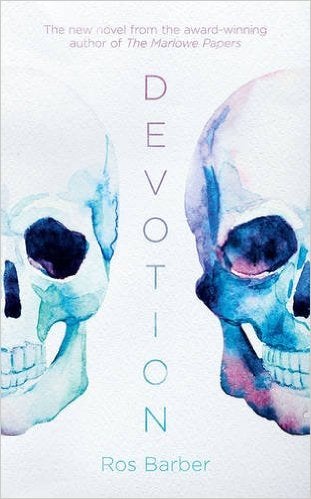If literature is anything to go by, our fascination with the idea of parallel lives – and notions of fate versus free choice – knows no bounds.
Ros Barber examines these themes in Devotion and joins a long and celebrated list of authors, including David Mitchell, Kate Atkinson, and Jenny Erpenbeck, who have also done so in the past decade or so. While it might not match the majesty of Mitchell’s Cloud Atlas or Erpenbeck’s wonderful End of Days, Devotion is nonetheless an enjoyable and engaging book.
The sheer degree of recent interest in these questions of how destiny or chance determine the course of our lives is itself noteworthy. The decline of religion in the West, which is another of Barber’s motifs, perhaps offers a partial explanation. The development of scientific knowledge, raising the shimmering possibility of parallel universes, is another side to this coin.
Alternative realities have, of course, been a staple for writers through the ages. Utopias and dystopias have been conjured by successive generations. But the glut of 21st-century novels which hint at the existence of parallel selves suggests a growing appetite among the reading public to be comforted by the thought that we can, somehow, find a more satisfying course if we just find the right fork in the road – and then take the right turn.
Is this a marker of dissatisfaction with modern life? Perhaps the certainties of a material world have left us a little hollow, in which case the chance that there is a happier version of ourselves available somewhere fills an emotional void. Then again, maybe our belief in material choice has simply extended to a view that we ought to be able to recalibrate our lives’ directions by right.
Devotion is set in a near future; one in which human advances seem on the whole relatively modest. London is still beset by fears over terrorism yet it is fundamentalist Christians who are the primary threat. Religion has become the preserve of crackpots, having been denounced into near non-existence by Richard Dawkins and his disciples.
The reference to Dawkins tells us that this is a future which is within our grasp. Yet it feels slightly jarring. Alternative realities may be the subject of this tale, but one in which Dawkinism has become the prevailing orthodoxy is hard to take very seriously. Perhaps it is simply a case of timing: Dawkins’s recent Twitter rants have made him appear a much more unreasonable – and unreasoned – character than might have been the case a few years ago.
Barber’s primary protagonist is Dr Finlay Logan, a psychologist who is struggling to come to terms with the death of his daughter in a sky-diving accident. Having been numbed by the loss of perhaps the one person he truly loved, Logan finds himself slowly but surely collapsing under the weight of his grief. He is a stranger to his wife and has cut himself off from friends and any sense of community.
Work is Logan’s only distraction and he is tasked with providing expert witness testimony in the case of a young woman, April Smith, whose guilt in connection to a religiously motivated mass killing rests on whether she is found sane at trial. With Smith seemingly driven by a desire to punish radical atheists, Logan understands that a verdict of insanity will hasten the redefinition of religion by law-makers as clinical madness.
Yet, like Logan’s own descent into mental instability, April Smith’s apparent psychological disturbance appears to be rooted in a particular, deeply nasty experience. And when Logan hears about the potentially transformative work being pioneered by Dr Gabrielle Salmon, a scientist specialising in consciousness studies, he asks her to consider Smith for treatment.
The mysterious “process” which Smith subsequently undergoes appears to have a remarkable effect as she emerges from a self-imposed, world-hating silence. The pain of her past experiences is removed, but so are any feelings of doubt about her actions as a killer.
Logan is stunned and disturbed by the change. But as he finds his own life spiralling further out of control, he begins to wonder at the inner peace of Smith and Dr Salmon and to consider whether “the process” is the only answer to his problems. The choice appears to be crucial but will the decision fundamentally alter Logan’s direction?
Barber’s prose is compelling and she brings a real sympathy to Logan’s character in particular. But here’s a funny thing. It is a tale about a disharmonious – not quite dystopian – future, and ought to have left me feeling disconcerted. Yet for reasons that are hard to pinpoint, Devotion, while undoubtedly a page-turner, ended up being not quite as profound as I had anticipated.
Subscribe to Independent Premium to bookmark this article
Want to bookmark your favourite articles and stories to read or reference later? Start your Independent Premium subscription today.


Join our commenting forum
Join thought-provoking conversations, follow other Independent readers and see their replies